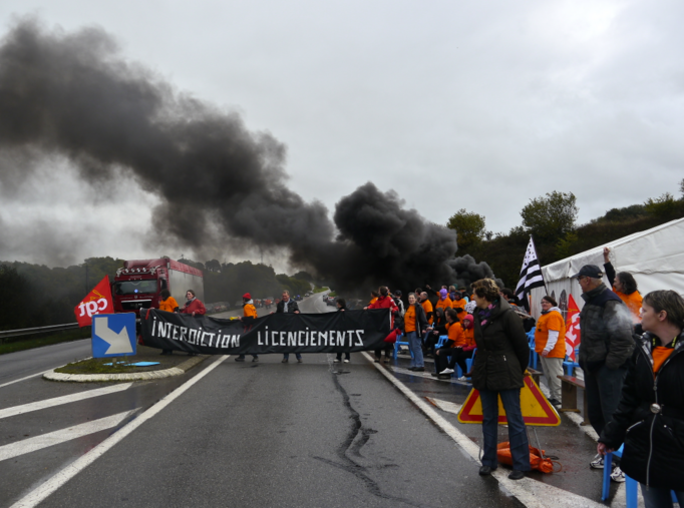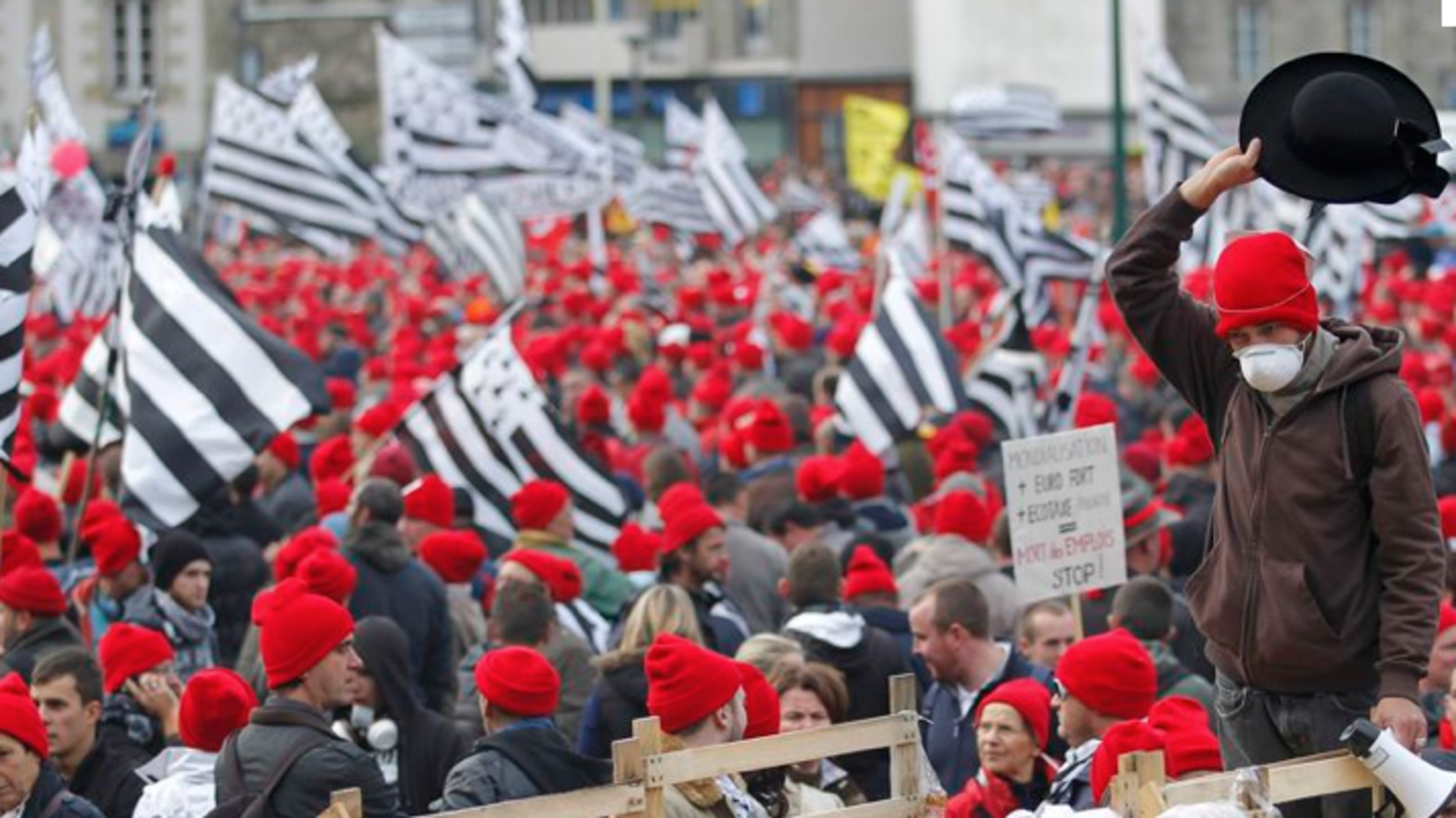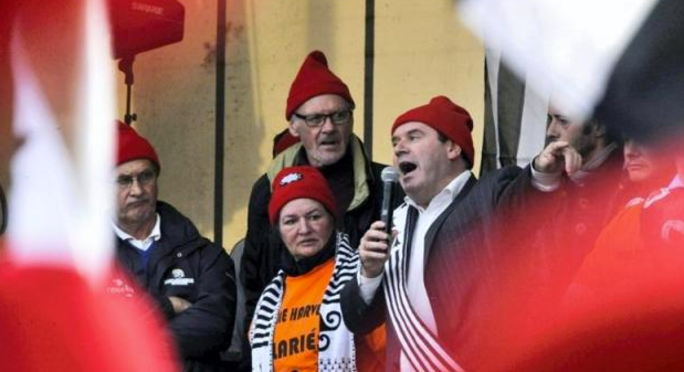Friends and foes alike agree on one thing about Christian Troadec: he upsets people. “You either love him or you hate him,” is an expression often used to describe the local politician. Just at the moment, it is probably fair to say that most members of the French government, from President François Hollande and prime minister Jean-Marc Ayrault down, probably fall into the latter camp. For Troadec, the mayor of the small Breton town of Carhaix-Plouguer, is one of the main figures in the current protests against the central government that have been sweeping across Brittany in western France in recent weeks.
The protests are against job losses caused by the region's faltering intensive farming industry but above all against the despised new green or 'eco-tax' that was due to come into force on January 1st 2014 – until the government suspended it, possibly until July - and which is likely to hit this isolated region hard. But though the grievances are modern, the history of protests in Brittany against central government is a long one, hence the wearing of red hats or 'bonnets rouges' by the demonstrators. These were the symbol of local opponents to a new tax imposed by Louis XIV back in the 17th century.
Troadec, a fervent Breton nationalist born into a local Catholic farming family, is steeped in the region's history and is passionate about the cause of his beloved region. But though his regional credentials are clear enough, it is a little harder to pigeon-hole him politically. Radical, green and of the Left, Christian Troadec is not formally affiliated with any party and is keen to stress that political parties are less important than the Breton identity and the need to work together to solve the region's economic crisis. “The Breton people know how to unite, to forget labels when things are going badly,” he says.
The mayor of Carhaix has certainly raised eyebrows by leading the protests alongside Thierry Merret, head of a local branch of the powerful mainstream farming union FDSEA, and who is of the right politically. Such actions have earned Troadec and other demonstrators the scorn of national politician Jean-Luc Mélenchon, of the radical left Parti de gauche, who recently staged a counter-protest against events in Brittany, claiming the bonnets rouges were a “gathering of idiots” who were “the slaves protesting for the rights of their masters”.

Enlargement : Illustration 1

But Christian Troadec, firmly rooted in the Breton landscape, shrugs off such attacks. “I am surprised to see someone in Paris make a judgement at distance about a popular protest without having come here themselves,” he observes. “Mélenchon insulted his own people.”
They are a people the local mayor knows well, and who know him. It was Troadec who co-founded the local and eclectic music festival the Vieilles Charrues, which has become one of the most popular events of its kind in Europe. He also led successful efforts to stop the closure of maternity and surgery units at the local hospital, earning him re-election as mayor in 2008 with 68% of the votes and a seat three years later on the local département council - roughly equivalent to a county council - even if his attempts to become an MP last year were less successful.
The recent protests have certainly kept Troadec busy. Mediapart tried to catch up with him last week, on the eve of the government’s announcement it was releasing close to one billion euros in funding and loans to finance a 'pact for the future', in a bid to bring some calm to Brittany. However, when Mediapart arrived at the mairie in Carhaix, the mayor had already driven off to lend his support to strikers at nearby Poullaouen, where the Marine Harvest salmon processing plant is due to close next year with the loss of nearly 300 jobs.
Even there it was not easy locating Troadec amid the thick smoke exuded by burning tyres and wooden pallets. Eventually Mediapart tracked down the politician, who himself began his working career as a journalist before selling off his small local paper to a larger title, and who now runs the Carhaix-based brewery Coreff, to carry out an interview which can be read on the next page.
To spend time with Christian Troadec is to see his political style in action. He greets everyone with the familiar 'tu' form of speech, shakes hands with all, from the women working at Marine Harvest who have been “thrown away like Kleenex” by their Norwegian shareholders, to local reporters, foreigners and the gendarmes whose job it has become to monitor the Breton workers who block the routes rather as protesting Breton farmers blocked railway lines back in the 1970s.
On this day the Carhaix mayor is wearing a grey suit and blue shirt and not sporting the black and white sash with Breton ermine that he often prefers to the official French tricolor sash traditionally worn by mayors and that he impudently wears on occasions when representing the mayor's office, for example during the protests at Quimper a week ago. “A provocative act that's punishable by law,” notes a socialist councillor scarcely able to hide his annoyance.

Enlargement : Illustration 2

In his strong regional accent Troadec happily switches between discussing the Breton rebellions of 1675 against a new tax imposed by Louis XIV, the more recent protests of the 1960s against the government in Paris, and the current demonstrations. In between he has time to laugh with a young restaurant owner who has come to give some pizzas to the local strikers about an image doing the rounds on social networks that shows Brittany physically and politically separated from the rest of France, leaving Paris just forty minutes from the Atlantic Ocean.
Troadec talks, too, about the rejection by prime minister Ayrault of his ultimatum over abolishing the eco-tax altogether, the scandal of low wages paid to migrant workers in other EU countries - “the great tragedy of Europe” - a practice known as 'social dumping' which many claim is destroying Brittany's food industry, and the “danger” of the rise in support for Marine Le Pen's far-right Front national. In passing he notes that he has had calls from sympathisers in Alsace in north-east France and the Basque country in south-west France who want to get hold of the iconic red hats.
Above all, Troadec shows great pride in the actions taken by the Breton people in recent weeks against the government's green tax and the factory closures. “In every revolution we have been the first,” he says, praising the unity of people from all political backgrounds. He is keen to point out, too, that his desire to reach out to a broad-based coalition is nothing new. When putting together his first political team in 2001 to take on the established Left and Right party groupings in the town, Troadec says he brought “very different people” on board. “There was a union official from a company in Carhaix and his boss,” he recalls. “They opposed each other all year at the negotiating table but there, as part of the political group, for the good of the commune, they put their differences to one side.”
Christian Troadec's outspoken nature can make some potential supporters wary. Bruno Lebras, one of the 900 Breton workers who have lost their jobs at abattoirs run by the ailing company Gad, says he was guarded when he first met the mayor because of what he saw as “a bit of populism” in his comments. He continues: “But very quickly, over the course of the [protest] actions, I saw a real man of the Left. Agreed, he doesn’t do things by half. You're with him or you're against him. But his approach is sincere.” Lebras concludes: “He defends Brittany with his heart and I understand why he scares the socialists because lots of disappointed people on the Left can find a voice through him, especially at this moment.”
An edited version of Mediapart's interview with Christian Troadec is on the next page.
'The government shows a complete lack of understanding of the Breton people'
Mediapart: The prime minister Jean-Marc Ayrault rejected your ultimatum calling for the scrapping of the eco-tax by midday on Wednesday [November 6th] and condemned the methods used by the 'red hats' of whom you are one of the leading figures. Will you respond with new actions?
Christian Troadec: As a window opens, the government shuts the door in our face. The issue could have been added to the agenda of the ministerial cabinet meeting [editor's note, which occurs each Wednesday] especially as the meeting to discuss the pact for the future for Brittany was to follow. It would have been a strong message of encouragement and peace sent to the Breton people, a sign that he had heard us, that he is ready to take part in an alternative project for Brittany, knowing that 93% of people in Brittany are in favour of abolishing this eco-tax. That was the idea of this ultimatum. It's extraordinary to criticise us for having set an ultimatum and also to give us a so-called lesson in democracy when we are subject to decrees and diktats from Paris without having any rights in the matter.
The collective organisation “Vivre, décider and travailler en Bretagne” [“Live, make decisions and work in Brittany”] which was behind the big demonstration in Quimper last Saturday [November 2nd] is going to... decide on the next step in the movement. We are thinking about a second big gathering and this time it will not be 30,000 but tens and tens of thousands of people who will take to the streets. The demonstration might take place in a big city. It might be Rennes [in Brittany] but also Paris.
The government must understand that a huge mobilisation is in the process of being born in Brittany and beyond. Each day we receive messages from all of Brittany and not just Brittany. Many French regions, some of whom certainly have strong identities, the Nord-Pas-de-Calais [north-west], Alsace, the south of France, the Basque country, are encouraging us to go further in our struggle and want to imitate us.

Enlargement : Illustration 3

Mediapart: What will your response be if the government does not shift from its firm line? Would your harden your approach, and consider violent acts against the symbols and property of the state, as did the Front de libération de la Bretagne (FLB) ['Brittany Liberation Front'] and the two ARBs - the Armée républicaine bretonne ['Republican Breton Army'] and Armée révolutionnaire bretonne ['Revolutionary Breton Army'] - at the end of the 1960s?
C.T.: When we invited the Breton people to demonstrate at Quimper we said loud and clear that it was to be in a peaceful manner without violence. That was the case with the very great majority of the demonstrators present. The economic and social situation in Brittany at the end of the 1960s, which saw the birth of the FLB and the ARB, has some similarities to the Brittany of today. The fear is probably the same but, however, there is one notable difference: Brittany, alas still cut off from the Loire-Atlantique [editor's note, the département to the south-east that contains part of the historic region of Brittany] today has a democratically-elected regional assembly. This assembly, which contains councillors in favour of autonomy in the ruling majority, has made proposals, particularly over decentralisation issues and for the right to be a test case, for effective powers...and also for Breton public service television.
The government in Paris, which has been badly advised, is not listening. This is a serious error that shows a complete lack of understanding of the Breton people. In order that the temptation to use violence does not one day pollute the debate and impair the ability of people in Brittany to live together, a response is urgently needed to the Breton people's institutional and cultural demands, at the same time as one addresses economic and social issues. The ball is in the Socialist Party's court.
Mediapart: Why did you choose to wear red hats in reference to the anti-tax rebellion which shook Brittany in 1675 and which ended in a bloodbath? It's a long way from the stakes involved with the government’s eco-tax...
C.T.: We took up the symbol of the rebellion against the papier timbré [editor's note, a tax on the official stamp needed for all legal transactions], an additional tax unfairly brought in by Louis XIV, because the eco-tax is seen to be an injustice. It's one tax too many at the worst time for the Breton economy when 8,000 jobs are going in the food-agriculture industry in 2013 with 5,000 more going in 2014. Moreover, the 1675 red hat rebellion was also a call to action a century before the French Revolution, an event in pre-Revolutionary society when farmers, small traders, artisans and peasants produced a list of grievances, grouped under the name of the 'Peasant Code', demanding political representation and the abolition of certain privileges accorded the nobility, including the unpaid labour that peasants were supposed to provide for local lords.
Centuries later the red hat has also become the symbol of workers who have been thrown away like Kleenex by companies in the food-agriculture industry, such as Doux, Gad, Marine Harvest. We are not just calling for the abolition of the eco-tax but also the end of social dumping which is in the process of completely destroying Breton industry through unacceptable competition across European, while at the same time whipping up a strong anti-European sentiment. Today low-cost workers from Eastern Europe are being paid 5 euros an hour in abattoirs in Poland and Germany, when in Brittany we are paid a minimum of 16 euros an hour. How can you compete with that?

Enlargement : Illustration 4

Mediapart: The economic lay-offs, the taxes, the centralised state, the technocrats, François Hollande...the protest at Quimper was an accumulation of grievances without a clear slogan. What are your demands?
C.T.: The theme of the Quimper demonstration was employment and Brittany, the abolition of the eco-tax and a real decentralisation in France with more powers, more functions for those who want them. Look at Scotland which, with just over six million people, handles a budget of 40 billion euros. The historic region of Brittany [editor's note, larger than the current Brittany administrative region] has for its nearly 5 million inhabitants a budget of just one billion euros! Ninety-five percent of our finances come from state allocations! We have almost no financial autonomy and absolutely no room for manoeuvre to respond to the urgent situation and to people's concrete concerns.
Mediapart: To be clear, and given that the government intends signing one at the end of this month, what pact for the future do you want to see for Brittany?
C.T.: We want an innovative, experimental pact. We want to have the right to organise ourselves, the end of centralised power, more powers for our region, we want Paris to allow us the freedon to harness our own energy, and we want an end to the French administrative straitjacket. What is true for Brittany may not be the same for the Centre region [editor's note, south of Paris]. Here we demand the right to be a testing ground, for specific reasons: our distant geographical location, culture, identity, solidarity and very strong social ties. The Breton people are capable of rallying together, and being proactive.
We want to be given the tools so that we can bring a more immediate and concrete response to each of our problems in the areas of culture, the economy and social issues. That is not unthinkable in Europe. Lots of regions function like that. I know the idea is unthinkable for senior civil servants, the technocrats who control more of the power than politicians in Paris, but that's an obsolete way of doing politics.
Mediapart: The Quimper demonstration was also a eclectic gathering of politicians, farmers' leaders, unions, bosses, workers, artisans and traders. You have succeeded in bringing together opposites. How do you explain that?
C.T.: Because there is general discontent, real solidarity and a cement that unites us; the fact of being Breton. It's not the first time that we've all gathered together despite our differences and diverging views. In the 1950s the Comité d’études et de liaison des intérêts bretons (CELIB) [editor's note, Breton Liaison Committee] gave the state an economic development plan to solve the issue of under-development in Brittany by bringing together Breton society in all its diversity. That enabled us to get road projects with toll-free motorways [editor's note, the region resisted the imposition of motorway tolls found in other areas of France], the modernisation of railway lines and cultural developments.
--------------------------------------------
English version by Michael Streeter


